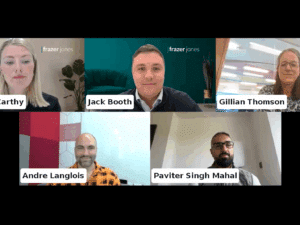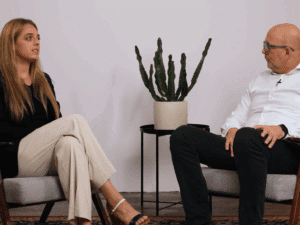Building a career in reward webinar replay: from analyst to leader
As organisations face growing pressure around pay transparency, global mobility and diversity, equity and inclusion (DEI), the reward function is gaining visibility and influence. But for many HR professionals, whether early in their career or looking to pivot from another human resources specialism, navigating the evolving landscape can be complex.
That’s why Frazer Jones hosted a live webinar on Tuesday, 9 September 2025, bringing together three senior reward leaders to share their journeys, advice and lessons learned. Hosted by Leona McCarthy and Jack Booth, the session featured:
- Andre Langlois, Director, EY
- Gillian Thomson, Head of Reward, Interim
- Paviter Singh Mahal, Compensation Manager, ICG
Together, they offered practical insights into reward strategies, career progression and the skills needed to thrive in this evolving space.
What is reward, and why does it matter?
“Reward is the perfect blend of finance with an HR lens,” said Paviter Singh Mahal, explaining how the function balances analytical rigour with human impact. While many roles in finance focus on budgets and cost centres, reward professionals are driven by the people behind the numbers.
“We’re not just reducing the budget of cost centre 0010,” Paviter explained. “We’re making decisions that affect real people.”
From incentivising performance to supporting retention and compliance, reward professionals play a strategic role in shaping culture and driving business success. “We’re a control and support function,” he added. “We put in checks and balances while helping the business reach new heights.”
Reward management also plays a critical role in aligning pay structure with business goals. Whether through performance management frameworks or total reward packages, the function helps organisations attract and retain top talent.
Starting out: the skills that matter
For those entering the field as a reward analyst, technical skills are essential, but not enough on their own.
“You need to be savvy with tools like Excel, but also adaptable and commercially minded,” said Andre Langlois. “Reward is where the rubber hits the road in HR strategy. You have to understand the financial drivers and communicate them with empathy.”
Andre also emphasised the importance of storytelling: “It’s about delivering messages in a way people can accept and engage with.”
Understanding stakeholders and tailoring communication to different audiences is key. Reward specialists must be able to translate complex data into actionable insights for senior leaders, managers and employees alike.
Career journeys: no two paths are the same
Each panellist took a different route into reward consulting and management:
- Andre started in recruitment before moving through HR operations, systems and analytics, eventually specialising in reward consulting. “Trying lots of things across HR helped me realise I loved change and variety.”
- Gillian began as a generalist before gravitating towards reward. “I was the person happy to do the pay-review spreadsheets, and that led me into a global reward function. I’ve been in reward ever since.”
- Paviter entered the field directly, thanks to a nudge from his brother. “I’ve worked across a range of financial services firms, from HSBC to Cinven. Each one taught me that it’s not the size of the headcount that matters, it’s the discipline and focus you bring.”
These case studies show that there is no single path into reward. Whether you start in talent acquisition, people management or analytics, the key is to stay curious and open to new opportunities.
Pivotal moments and lessons learned
From interim contracts to major transformation projects, the panellists shared the experiences that shaped their career progression.
Andre spoke about moving to Manchester during a tough market: “It wasn’t a choice, but it gave me exposure to variety and helped me learn new things.” He also highlighted the value of consultancy: “It stretches you in ways you wouldn’t expect, and helps you understand your strengths.”
For Gillian, joining RBS was a turning point: “They rotated people through different roles every couple of years. I gained deep knowledge and experience that helped me move into a Head of Reward role.”
Paviter reflected on leading the ICARA wind-down process at BlackRock: “It changed my mindset. Everything we do in reward should leave things a little better than we found them.”
Building credibility early on
Attention to detail, consistency and communication were recurring themes.
“My first manager told me: ‘It’s not my job to review your work,’” said Paviter. “That stuck with me. I always double-check my data before it leaves my desk.”
Andre agreed: “Auditability matters. Lay things out logically so others can follow your thought process. And be concise, whether in meetings, interviews or presentations.”
Early-career professionals can build influence by understanding the needs of stakeholders and presenting data in a way that supports decision-making. This is especially important in performance management and retention planning.
Upskilling and staying current
Formal qualifications aren’t the only route to growth. While Gillian completed her CIPD early in her career, she focused on continual learning through hands-on experience.
“I said yes to projects, filled gaps and used external advisors to learn on the job,” she said. “I also did hay job evaluation training and survey provider training to understand benchmarking and market data.”
Paviter encouraged a mindset of operational excellence: “Look for ways to automate and improve processes. If you can save 20 hours a month without extra cost, that’s a win.”
To stay up to date, Gillian recommended LinkedIn, survey providers and industry bodies like the Reward and Employee Benefits Association (REBA). “Even if you’re in a regional role, seek out your networks.”
Many reward specialists also turn to podcasts and webinars to stay informed on trends in wellbeing, pay transparency and talent management.
Networking and mentorship
Connections matter, and they don’t have to be transactional.
“Start early and stay connected,” said Andre. “Some of the best opportunities come from serendipitous conversations.”
Gillian added: “People you worked with 10 years ago might be in completely different industries now. Keep those relationships alive.”
Paviter highlighted the value of recruiter relationships: “When you check in regularly, they know what you’ve done and can match you to the right roles. That’s where mentoring and career guidance really come into play.”
Advice for aspiring leaders
“Don’t wait to be told what the next step is,” said Gillian. “Be creative, improve processes and think one step ahead.”
Andre encouraged professionals to embrace change: “Setting up reward functions or working in changing environments teaches you adaptability and cost-benefit thinking.”
Paviter summed it up: “Reward has a special place in a firm. We’re here to incentivise and support people, and that human element is what makes it so powerful.”
Final thoughts
Whether you’re a Reward Analyst, a generalist exploring new paths, or a startup HR leader building your first pay structure, the webinar offered a wealth of thought leadership and practical advice. From performance management to total reward, the field continues to evolve, and so do the opportunities.
Frazer Jones will continue to share insights through future webinars, articles and podcasts. If you’re curious about your current role or planning your next move, stay connected and reach out.



